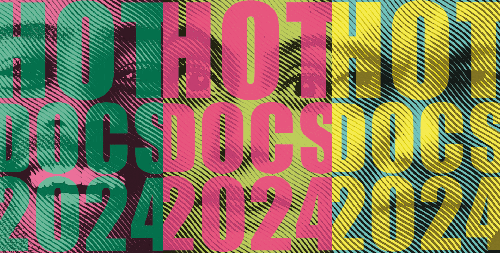
Feb 24, 2025
After a year of organizational turmoil and a $2 million deficit in 2023, Hot Docs International Documentary Festival has once again posted a record-breaking deficit in 2024.
Hot Docs - the second-largest documentary film festival in the world - posted a $2.6 million deficit in 2024, according to their CRA charitable return.
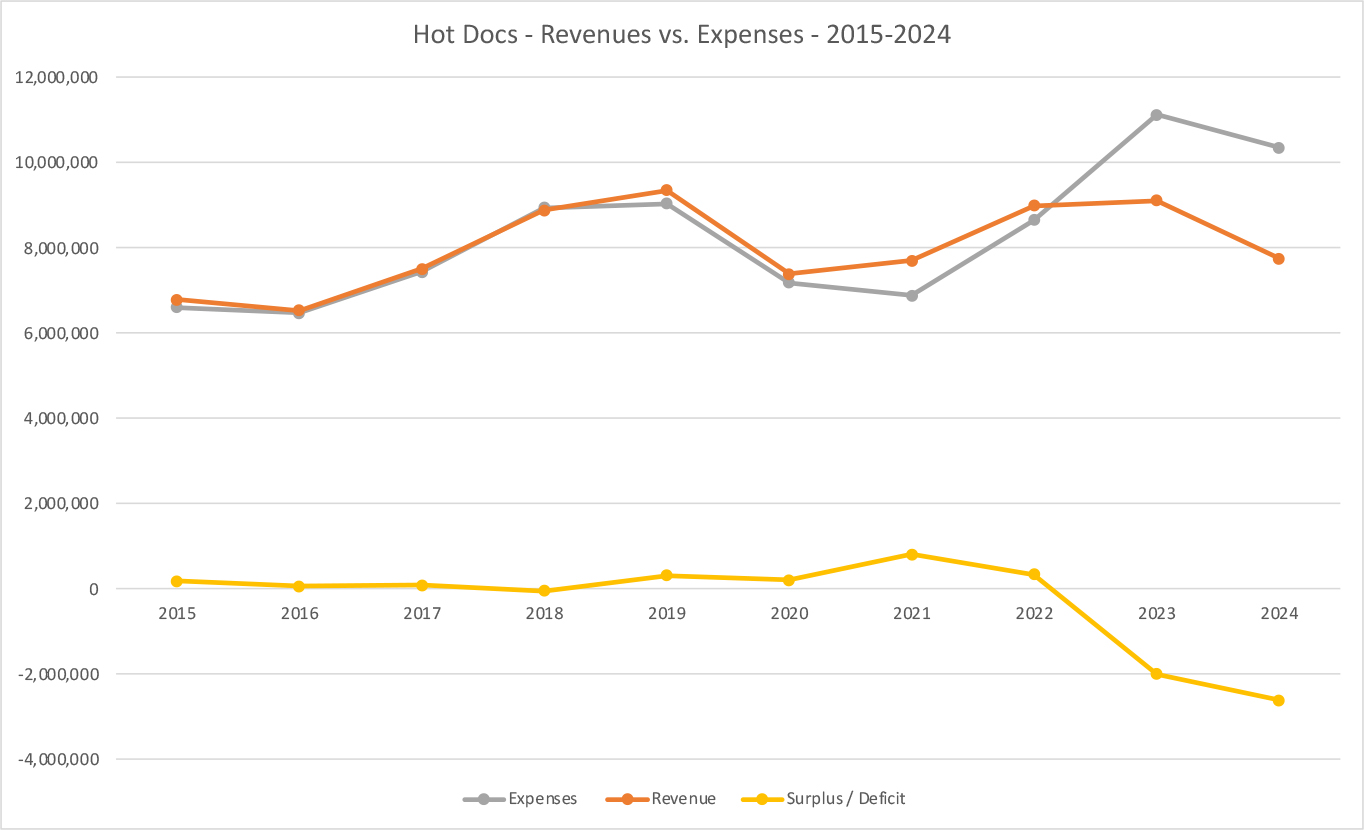
After years of record-breaking government funding, Hot Docs' 2024 revenues finally dipped just below the historical 10-year average (2015-2024) to $7.74 million in 2024, compared to $9.1 million in 2023 and $8.98 million in 2022. Gone are the golden years of special COVID funding, that saw Hot Docs collect between $1.6 million to $3 million per year from all levels of government. In 2024, Hot Docs collected only $1.1 million from all levels of government combined, the lowest amount of government contributions since 2017.
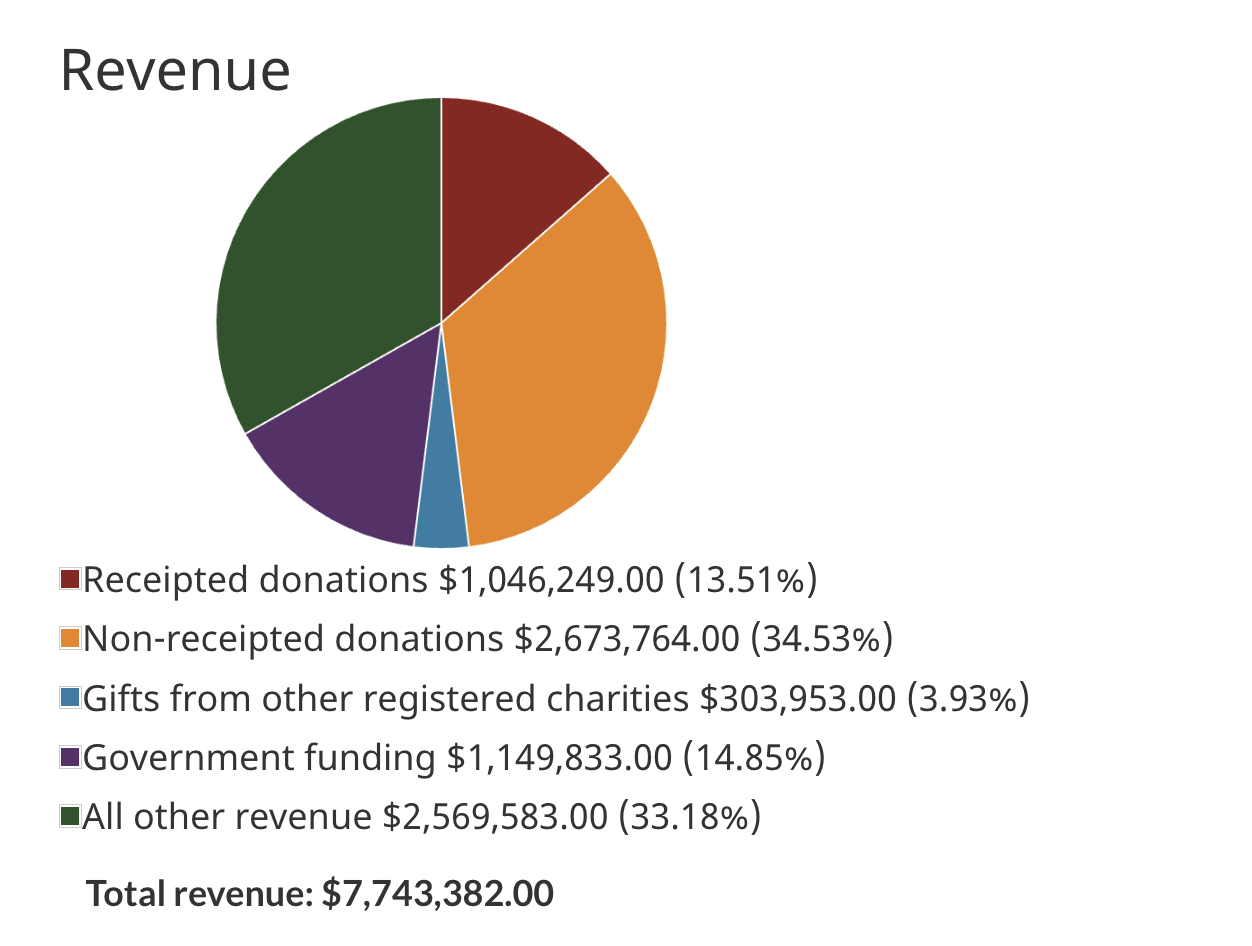
However, the biggest concern for Hot Docs' revenues is the simple yet concerning fact that filmgoing audiences just haven't returned. In 2019, before the COVID pandemic, Hot Docs earned nearly $4.3 million from the sales of goods and services. In 2024, the year after global agencies declared an end to the COVID-19 pandemic, Hot Docs pocketed only $2.56 million in earned revenues. This decrease in audience of roughly 40% between 2019 and 2024 is a concerning trend for all filmmakers and film industry professionals, but has spawned a crisis for large-scale film festivals and theatre owners like Hot Docs.
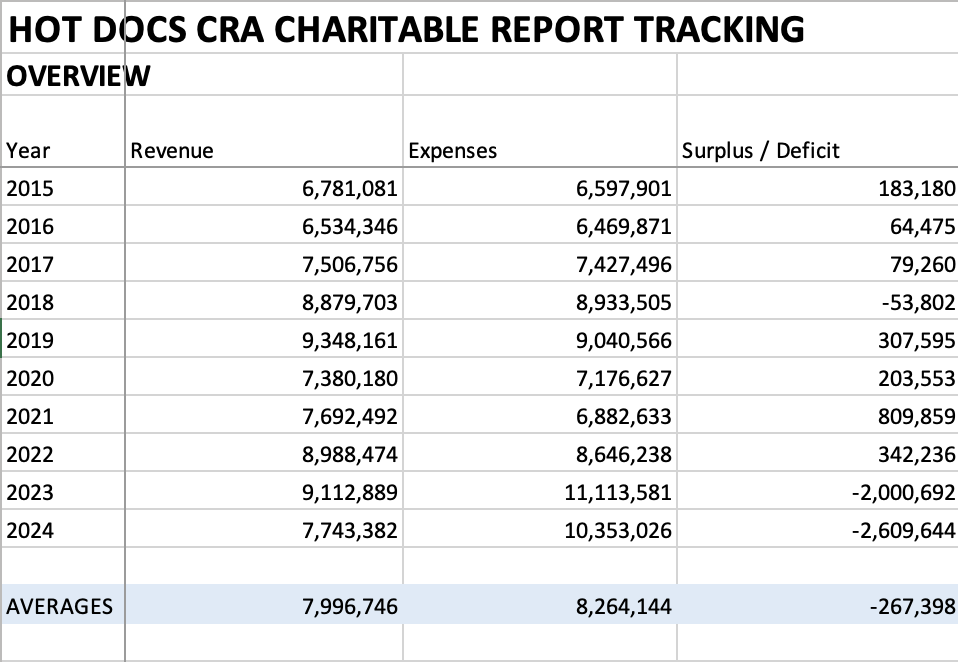
However, there is good news. According to their 2024 return, Hot Docs still maintained cash, bank accounts, and short-term investment assets of over $4 million as of May 31, 2024. However, this is a nearly 50% decrease of their liquid assets since only 2022, when Hot Docs boasted over $8 million in the bank. The combined $4.6 million deficit from 2023 and 2024 is unprecedented for Hot Docs, which - since 2015 - only ever posted one deficit year: a -$54,000 loss in 2018.
Also of note is that 2024 was the first year that a single staff member was paid between $250k-$300k. Prior to this, the highest compensated staff ever was paid between $160k-$200k. It's impossible to say for certain, but it is likely this was the salary of Marie Nelson, Hot Docs' former President, who resigned in controversy in July 2024. Nelson was criticized for - amongst other things - the fact that she was an American living in the USA (former executive at ABC News and PBS), and who flew first-class and put up in Toronto hotels during her tenure, with a financially struggling Hot Docs footing the bill. (More on Hot Docs 2024 organizational crisis here.)
Hot Docs' 2024 fiscal year marked the highest ever "travel and vehicle expenses" at $435k, an increase of 260% from the pre-pandemic year of 2019.
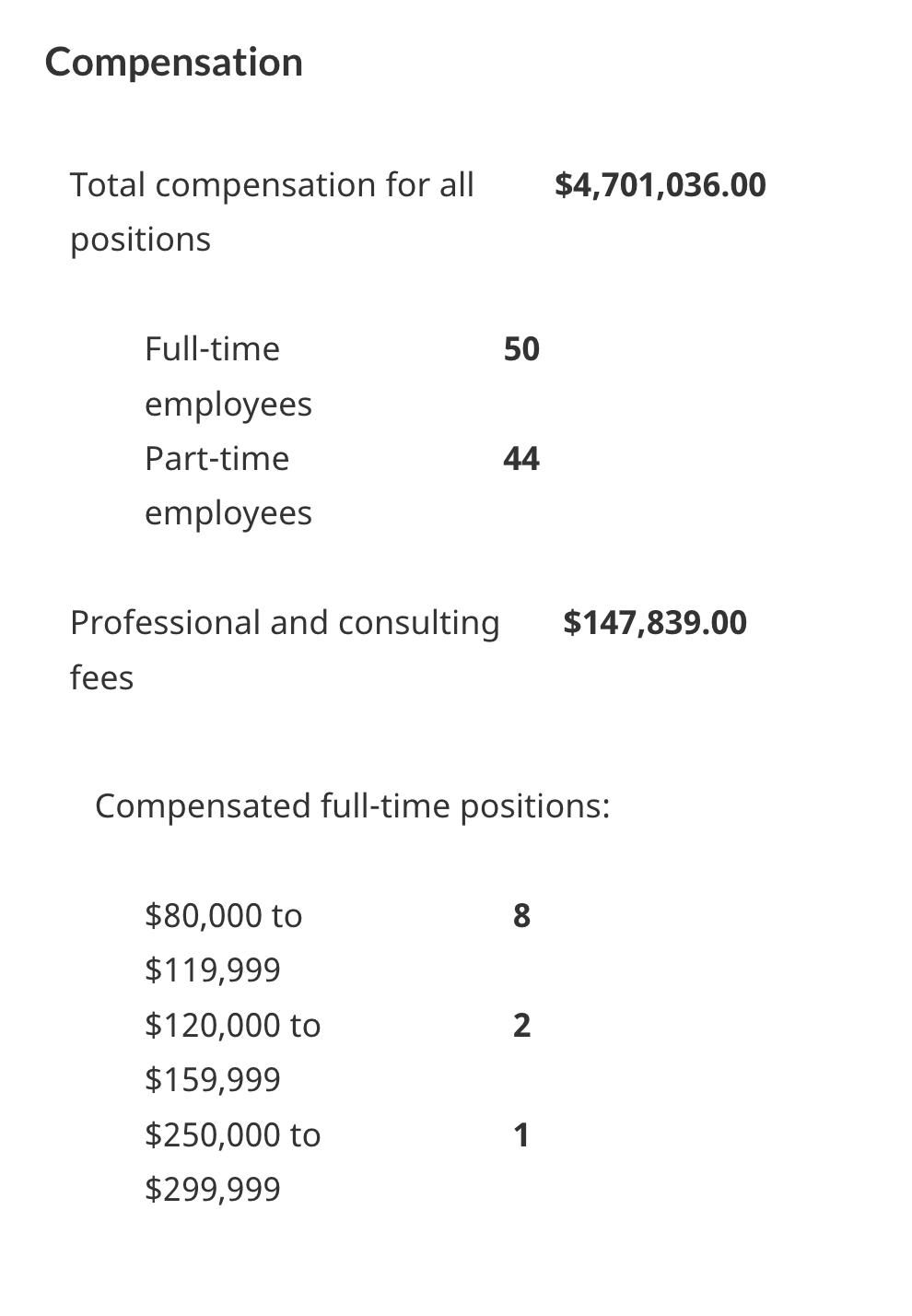
Hot Docs staffing costs also ballooned to all-time highs in 2024, with $4.7 million being spent on staffing labour in 2024. This cost was marginally higher than the previous year of 2023 ($4.56 million in employee compensation), but was a significant 43% increase in staffing costs when compared to the pre-pandemic year of 2019.
Interestingly, while staffing costs continued to rise marginally in 2024, Hot Docs overall staff team shrunk. Hot Docs' full-time staff shrunk from 84 to 50 (-40%) as of May 31, 2024, while their part-time staff increased from 36 to 44 (+22%). Total full and part-time staff shrunk from 120 to 94 in 2024, marking a combined 17% decrease in staff for the year. And these numbers almost certainly came before Hot Docs' mass layoffs that came in June 2024.
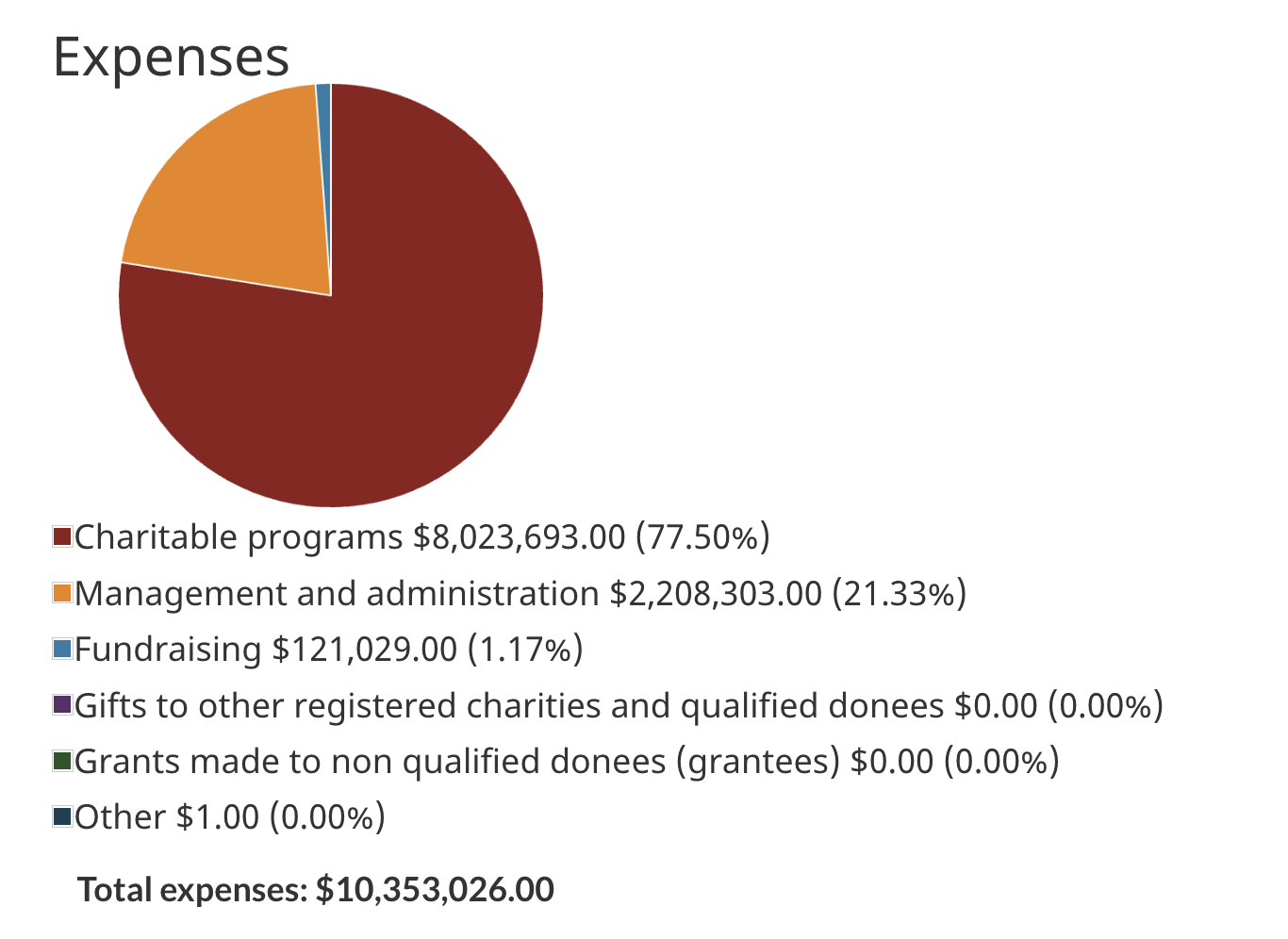
While staffing costs were static and total staff positions were reduced, Hot Docs interestingly posted a 49% increase in their total expenditures on "management and administration", totalling $2.2 million in 2024, versus $1.48 million in 2023. While how this budget line is accounted for is questionable, it seems to indicate that in 2024 Hot Docs prioritized funding it's middle and upper management, at a time when the overall staff size was shrinking. Office supplies and expenses also ballooned to $1.29 million in 2024, with a 134% increase from 2023's $553k.
On the other hand, a variety of expenses were reduced at Hot Docs in 2024. Advertising expenses shrunk by a third to $645k from 2023's $977k. Occupancy costs went down nearly 30% to $191k. And professional and consultant fees were quartered, to $148k in 2024 from $598k in 2023.

This worsening financial bottom line in 2024 paints a grave picture for Canada's premiere documentary film festival, and illustrates why the past year at Hot Docs has been marked by staff and board resignations, layoffs, temporary theatre closures, a scaling back of programming, and - as of November 2024 - an ongoing attempt to sell the Bloor Street Hot Docs Ted Rogers Cinema.
Many have speculated that Hot Docs bricks and mortar Ted Rogers Cinema is largely to blame for the organization's financial woes, and therefore the sale of the theatre is the easiest route to save the organization. However, after analysis of these most recent financials, we at Inverted Pyramid would caution the documentary community that the simple sale of Hot Docs' theatre may not be the silver bullet we are all hoping for. In 2024, Hot Docs posted $373k in "interest and bank charges", which is most likely in part the interest paid on the Bloor Street mortgage. There was also $190k in "occupancy costs", which is likely property taxes, mortgage payments (against the principal loan), and other costs associated with keeping the lights on at the Hot Docs cinema, although we certainly can't say for certain. All-in-all, this means the sale of the Hot Docs cinema could free up over half a million dollars annually in expenses - nothing to sneeze at but also a far cry from the $2.6 million 2024 deficit.
Hot Docs bought the theatre for $8.4 million from Neil Tabatznik, partner and cofounder of film and TV company Blue Ice Group. The sale was assisted by the donation of $5 million from the Rogers Foundation, in honour of the late media mogul Ted Rogers, Canada's fifth richest person at the time of his death in 2008.
Now, nearly 9 years later, Hot Docs is hoping to sell the property for $7 million, a 17% loss of $1.4 million. While the move will free up resources and likely shore up Hot Docs' cash accounts, it will also result in increased office and venue rental costs for the organization on an annual basis going forward, as the organization finds a new home, or rents their old one from a new owner.
Perhaps this is the only solution for Hot Docs in the short term. However, it represents an outsized blow to the filmmaking and documentary community in Toronto and across Canada, as the world’s only free-standing documentary movie house now has a fate unknown.
---
**Please note, all the financial information in this article is sourced from the Canada Revenue Agency's publicly accessible Charitable Tax Returns for "Hot Docs". We have confirmed that Hot Docs Film Festival, Ted Rogers Theatre and Hot Docs Industry programming are all operated through "Hot Docs" registered not-for-profit incorporated charity, from which we got the above financials. However, there are limitations to this information and it is always possible that Hot Docs operates part of it's business through other organizations or registered businesses that are legally separate from "Hot Docs" the not-for-profit charity. For these reasons, the financial details above are not necessarily exhaustive, and they are only what we know from an external, public perspective. Without confirmation from the Board of Directors or upper Executive Management is difficult to know if the financial information presented here is complete.
To access these original reports, you can visit the CRA Charity search here.
Anyone with more information (or to point out any false or misleading information above) is encouraged to contact Pyramid.Inverted@gmail.com
---